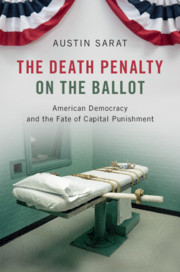
- Cited by 2
-
Cited byCrossref Citations
This Book has been cited by the following publications. This list is generated based on data provided by Crossref.
2019. Book Notes. Law & Social Inquiry, Vol. 44, Issue. 03, p. 851.
Griffin, Timothy 2021. Comparing expert versus general public rationale for death penalty support and opposition: Is expert perspective on capital punishment consistent with “disciplined retention”?. Punishment & Society, Vol. 23, Issue. 4, p. 557.
- Publisher:
- Cambridge University Press
- Online publication date:
- April 2019
- Print publication year:
- 2019
- Online ISBN:
- 9781108699617




